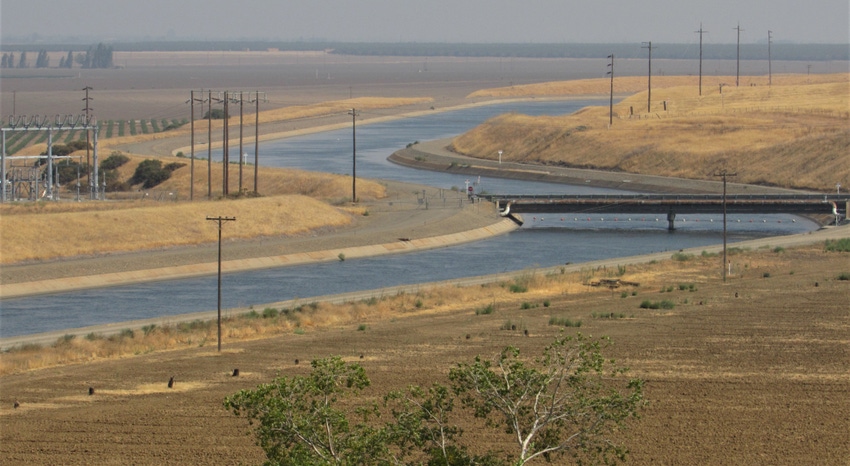
Despite much-heralded changes in the way federal water officials will determine Central Valley Project water allocations, bone-dry conditions since mid-January are forcing the U.S. Bureau of Reclamation to initially allocate only 15 percent of normal supplies this year to many agricultural customers south of the Sacramento-San Joaquin Delta, officials say.
After a decent start to the water year, the average snowpack statewide has fallen to 41 percent of the April 1 average as of Feb. 24, and current Northern Sierra precipitation is about 51 percent of the seasonal average, according to the California Department of Water Resources.
"Things have changed dramatically since mid-January and we have been very dry," CVP operations manager Kristin White said this morning in a conference call with reporters.
While the bureau took into account the new biological opinions that were issued in October and formally signed by President Donald Trump last week in Bakersfield, the need to preserve water quality and honor senior water rights is the first priority, White said.
"There are a number of different requirements in the new biological opinions, some of which are procedural," she said. "But (the opinions) are unlikely to be controlling this year given our hydrology."
The new opinions did enable the bureau to issue its initial allocations more quickly, White said. Under the old guidelines, the agency would have had to conduct a river water temperature analysis and have it approved by the National Marine Fisheries Service before issuing the allocation, she said.
"We recognize the importance of providing meaningful allocations early in the year, especially for our agricultural contractors' planning needs," said Ernest Conant, Reclamation's California-Great Basin regional director. "
The allocations
While agricultural water service contractors south of the Delta are promised at least 15 percent of their contract supplies, the region's municipal and industrial customers will get the greater of 65 percent of their historic use or public health and safety needs.
Friant Division contractors are allocated 20 percent of their Class 1 supplies -- the first 800,000 acre-feet of available water in the system -- and no Class 2 water.
As senior rights holders, the Sacramento River Settlement Contractors and San Joaquin River Exchange Contractors will get 100 percent of their contracted supplies, as will customers in the Central San Joaquin Water Conservation District and Stockton East Water District, the bureau advises.
North of the Delta, agricultural service contractors without senior rights will get at least 50 percent of their normal supplies, while Northern California municipal and industrial contractors will get the greater of 75 percent of their historic use or health and safety needs.
Wildlife refuges everywhere will receive their full allocation of 422,000 acre-feet, according to the bureau.
The allocations to growers could increase as the spring progresses if the hydrology allows, officials said.
Opinions issued
The initial allocations come as the U.S. Fish and Wildlife Service in October issued opinions that will affect water operations in the Delta and were three years in the making, as federal officials sought to update analyses of Delta smelt and other impacted fish that were more than a decade old.
On Feb. 20, California Attorney General Xavier Becerra filed suit in federal court in San Francisco on behalf of state regulatory agencies, claiming the federal opinions “run counter to the scientific evidence that was before the agencies” and failed to analyze the potential harm to the species, according to the Bay City News Service.
The lawsuit asks for court orders setting aside the biological opinions and prohibiting the administration from taking any action in reliance on the opinions until a new environmental analysis is completed, the news service reports.
The suit was filed after Trump ceremonially signed the record of decision Wednesday in front of thousands of cheering supporters in Bakersfield, accusing water regulators of flushing too much water into the Pacific Ocean and promising changes that will make the San Joaquin Valley's farmland "green and beautiful."
While Bureau of Reclamation Commissioner Brenda Berman says the litigation has brought "signifcant uncertainty" to water decisions, officials say above-average reservoir storage from previous wet winters is helping this year.
Reservoirs nearly full
According to the agency, several south-of-Delta and Friant Division contractors are rescheduling unused water from 2019 supplies into 2020 to add to this year's surface water allocations. That water is being stored in San Luis Reservoir and Millerton Lake. That carry-over option was instituted after a series of dry years in the early 1990's to encourage conservation and best water management practices.
Further, Shasta Lake, the centerpiece of the CVP, is at 108 percent of its average for this time of year and 78 percent of its full capacity, and the forecasted inflow is greater than 3.2 million acre-feet, according to officials. A forecast below that threshold would trigger a "Shasta critical" designation that could threaten even senior rights holders' supplies.
The federal Climate Prediction Center anticipates below-average precipitation throughout California over the next three months, and the U.S. Seasonal Drought Outlook expects drought conditions to persist or intensify in Northern and Central California through May 31.
"Most of our reservoirs are above average, but we've known for some time that the current storage capacity is not enough," Conant told reporters.
"Despite the hurdles brought on by litigation from the state and others, we remain committed to providing reliable water for families, farms, cities and the environment," he said.
About the Author(s)
You May Also Like






